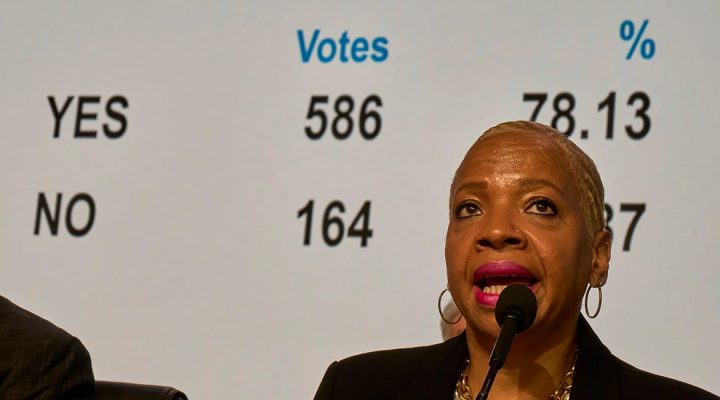The United Methodist Church is one step closer to restructuring its worldwide body to give greater latitude to each region to shape its faith and traditions.
Delegates to the thrice-delayed General Conference voted 586 to 164 for an amendment to the UMC constitution that now must be ratified by the various annual (regional) conferences.
Amending the UMC Constitution requires at least a two-thirds vote at General Conference, which this proposal easily surpassed with 78% of the vote. Then the Constitution requires an amendment receive at least a two-thirds affirmative vote in the various annual conferences.
Thomas J. Bickerton, president of the Council of Bishops, called this “a historic day for our church.”
The amendment is intended to relieve some of the pressure that has thrown the UMC into schism over the past two years causing about one-fourth of UMC-affiliated churches in the United States to disaffiliate. A primary driver of this conflict is differing views on LGBTQ inclusion — an issue much more hotly debated in the U.S. than in other regions of the world.
Under the new plan, the U.S. and church regions in Africa, Europe and the Philippines would become regional conferences with equal authority to adapt the Book of Discipline. Those adaptations could include qualifications for ordaining clergy and lay leaders; publishing their own hymnals and rituals, including rites for marriage; and establishing their own judicial courts.
The change acknowledges that some things that might be acceptable or desirable for the church in the U.S. might present cultural problems in other places.
This is a dramatic change for a denomination that has prided itself on presenting a unified approach to faith and practice wherever its churches are located in the world. The change acknowledges that some things that might be acceptable or desirable for the church in the U.S. might present cultural problems in other places.
That is particularly true of LGBTQ inclusion and ordination. Most of the U.S. churches that have left the UMC in the past year want to uphold restrictions on greater LGBTQ inclusion. That leaves within the U.S. church a likely majority — but not a unanimous view — of those who hope eventually to amend the Book of Discipline to allow gay clergy and same-sex weddings.
Also in the first week of the conference, delegates overwhelmingly approved a proposal titled “Regionalization and Contextualization of Marriage” that allows regional conferences to set their own standards for marriage rites and clergy ordination.
These votes came in the opening days of the UMC’s two-week General Conference. Also in the first week, delegates approved the departure of four Eurasia conferences from the denomination.
Those four annual conferences encompass 66 churches in Russia, Belarus, Kyrgyzstan and Kazakhstan. An autonomous Christian Methodist Church will be formed as a result.
Also during the first week, delegates approved the first set of several revised Social Principles to come before the body this year.
In new language addressing “Church and Governments” and “Basic Rights and Freedoms,” UMC delegates called for treating all people with basic human dignity regardless of whether they are male, female, intersex, transgender or nonbinary.
Other revisions addressed opposition to slavery, torture, genocide and war crimes; a reaffirmation of the denomination’s opposition to the death penalty, an affirmation of health care as a basic human right and support for the rights of indigenous, native and Aboriginal communities, migrants, immigrants and refugees, including displaced and stateless people.
The General Conference continues this week in Charlotte, N.C.


